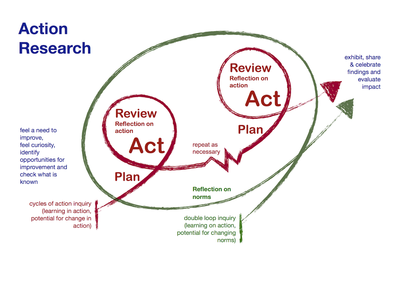Pedagogy
As indicated in the About section, the pedagogy adopts a constructivist, experiential, reflective and expansive basis for learning & teaching practice in work focussed learning. Online facilitation of work-focused action researchers, draws on several pedagogies and practices, such as grouping students in small action learning sets, peer assessment, blogging, and students encouraged to use patchwork media assessment rather than the traditional written text submissions.
Action Inquiry
- the learner is tasked with bringing about an innovation or change in the workplace - voluntary or paid
- an initial assessment of the workplace and the task/s to be carried out is made
- the learner employs an iterative action research loop of Plan, Act, Review
- this approach leans on constructivist, double-loop and expansive theories of learning
Reflective Practice
This is developed through review of –
- data gathered; learning diary; tasks; goals and appropriate theories
- leading to the adjustment, development or creation of a new framework of understanding and ‘practical hypotheses’
- resulting in new plans and repeating the action inquiry cycle
- based on Schön's thinking
Work Focus
- more than work-based
- the subject of study is the innovation in practice or organisation at work, rather than an abstract discipline
- both the action and the title of the study has therefore to be negotiate
- knowledge is acquired through
- work colleagues
- other students on the degree
- facilitators
- hot-seat experts
- and the wealth of internet information available
- based on experiental learning
Online Community of Inquiry
- study is integrated with the rest of the learner's life
- vital to establish an online community of inquiry …
- … to share work, seek support and engage in critical dialogue with peers & tutors
- online skills are vital for continuing work in the modern workplace
- based on theories of community of practice
Multi-disciplinary and Inter-professional
- developing competence communicating & collaborating with other professionals
- able to draw on knowledge from a wide range of sources
- this, and studying online, draw on connectivist theories of learning
Patchwork Media Assessment
- a portfolio of ‘patches’ including authentic work-place products
- appropriate & preferred genre and media (reports, slideshows, movies)
- reflective pieces (analyses, plans, but also poems, plays or artworks).
- ‘stitching’ of the learning journey to create the patchwork
- shows how the required learning outcomes have been achieved
- exhibition to communicate & evaluate findings
- Adapted from Richard Winter’s work

